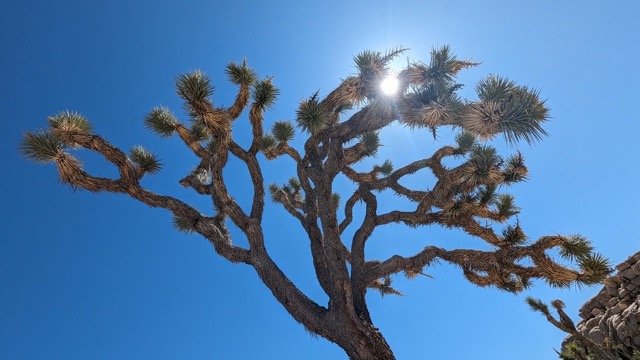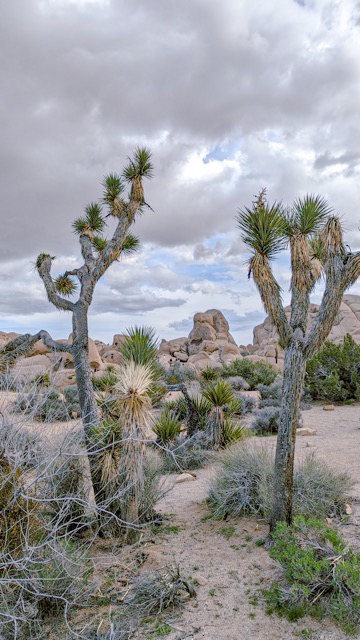Joshua Trees
BY RYAN SABALOW, CalMatters
Democratic Assemblymember Juan Carrillo has mixed feelings about the Joshua trees that are scattered across his sprawling Southern California desert district.
“The Joshua tree is an iconic symbol of the high desert,” he told CalMatters. “We have to save that. We have to preserve it.”
At the same time, he’s a former planner for the city of Palmdale, so he knows that efforts to protect the trees will make it harder to build housing and commercial developments in his economically disadvantaged district in the Mojave Desert.
It’s with those concerns in mind that Carrillo introduced legislation, Assembly Bill 2443, that would give commercial developers a break from the state’s newly passed protections for one of the state’s most recognizable – and imperiled – trees. Perhaps surprisingly in a state known for its environmental advocacy, the bill last week passed its first committee over the objections of nearly every major environmental group in the state.
The legislation comes on the heels of Gov. Gavin Newsom last summer signing the first-ever law protecting the Joshua trees, which can live for hundreds of years.
An estimated 4 to 11 million Joshua trees grow across the vast area of Southern California, including in the Joshua Tree National Park, according to state estimates. Climate models suggest that by the end of the 21st century, much of the species’ range may no longer be viable due to droughts and wildfires. But the California Fish and Game Commission, which sets state endangered species protections, deadlocked in 2022 on whether to officially declare the species threatened.
Last year’s law sets restrictions on how many trees can be cut and requires developers to pay a fee for each tree they remove unless they acquire and restore habitat to mitigate the ecological damage. The fees the state collects are used to replant trees, save habitat and buy new lands for Joshua tree sanctuaries.
The law allowed cities and counties to set lower fees for small projects, like housing and public works. Carrillo’s bill would let local governments offer the same benefits to large commercial and industrial projects.
The bill now faces an uncertain future as state lawmakers consider the state’s ballooning budget deficit. (The bill’s legislative analysis declares the fiscal impacts of Carrillo’s bill as “unknown.”) Carrillo’s bill must next pass the Assembly Appropriations Committee, where thousands of controversial – and potentially costly – bills have died in what’s known as the “suspense file.”
Meanwhile, the California Building Industry Association, which supports this year’s bill, has donated at least $300,000 to sitting legislators’ campaigns in the past two years. By comparison, the Sierra Club, an opponent, has only donated around $19,000 over the same period.
Why environmentalists oppose Joshua tree bill
Last year’s bill had grudging support from environmentalists. In 2019, the Center for Biological Diversity petitioned state officials to list Western Joshua trees as “threatened” under the state’s Endangered Species Act, although they are not protected under the federal version of the law. The listing would have led to more stringent prohibition on development over the thousands of square miles where Joshua trees grow in California, including the fast-growing cities of Palmdale, Lancaster, Hesperia and Victorville in Carrillo’s district.
The compromise legislation last year provided the first-ever protection for Joshua trees while setting rules for development.
In a recent letter to the legislature, Brendan Cummings, conservation director for the Center for Biological Diversity, called Carrillo’s bill a dangerous piece of legislation that “drives a bulldozer” through last year’s bill and the state’s endangered species law.
“The bill is an unnecessary, overbroad, counterproductive, and … would unravel the delicate and carefully-crafted compromise,” he wrote.
Importantly, lowering fees for commercial and industrial development projects would eliminate more than half of the state’s funds, Cummings wrote.
Critics say fully protecting the species would create a major barrier to meeting the state’s ambitious goals to expand housing and build renewable energy projects across a range that spans portions of Inyo, Kern, San Bernardino, Los Angeles, Riverside and Mono counties.
Carrillo said he supported last year’s legislation.
“But the problems I saw with that was the agreements would only be for single-family, multi-family (home developments) and some public works projects,” Carrillo said. “It did not include commercial and industrial development.”
Carrillo said it’s critical for commercial development to grow alongside his district’s iconic Joshua trees.
“Local governments deserve an equal shot at economic development in the region,” said Carrillo who was elected in 2022. “The high desert has been forgotten for decades, and that’s one of the reasons I decided to run for office.”
For More Environmental news visit www.zapinin.com/environment



